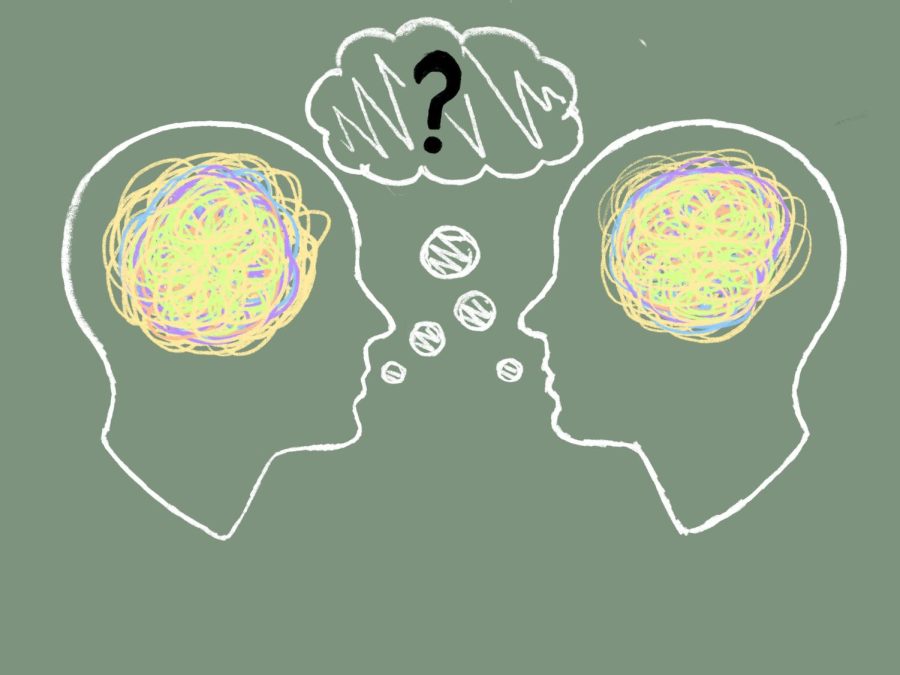Why We Must Never Stop Communicating in the Real World
Communicating virtually creates long-term issues, meaning face to face conversation needs to be prioritized.
We live in a surreal world. A world no past generations would recognize as a possible reality. Imagine a place of blaring screens, disappearing photos, messages sent to friends and family with the effortless click of a button. Communication has faced radical revolution. Handwritten letters to loved ones are almost non-existent. Waiting for an answer from a job interview, or about the fate of a friend no longer takes weeks due to mailing systems. Instead, everything is electronically done.
While this provides extreme efficiency, it has resulted in the loss of vital benefits of in-person communication without warning. This technological revolution that we have grown up in, most having phones in their hands since the elementary school age, hasn’t allowed for graduality. Therefore, we haven’t had the chance to process these chances in the blinding hypnosis of their nuance, leaving detrimental consequences undiscovered. “The act of talking to someone gets lost because when you talk to someone you get facial expressions which are important when communicating…and facial expressions…say more than emojis do,” said AP Psychology teacher Steven Dyer.
90 percent of communication is nonverbal according to The University of Texas. “Albert Mehrabian, a researcher of body language, who first broke down the components of a face-to-face conversation…found that communication is 55 percent nonverbal, 38 percent vocal, and 7 percent words only,” said the University. This means that fleeting photos sent on Snapchat and split-second views of Instagram posts, result in the loss of major communications making the communication that does happen grossly superficial. “The single biggest problem in communication is the illusion that it has taken place,” said famous playwright, George Bernard Shaw. Many social media platforms create such an illusion. Speaking in person gives “more authentic viewings of people and a more accurate representation of what the person’s thinking and feeling at the time” according to Dyer. “You can better interpret how somebody is receiving what you’re saying and maybe make more appropriate responses,” said AP Psychology teacher Dianne Bessette.
Genuine communication is what we need to save the world. We innately require this to create solutions for society’s multitude of issues, for the collapsing environment, masses of starving people sleeping on concrete, and economical structures that are withering away under our watch. The exchange of handshakes, of signs sent through eye contact, all matter. We need to see if someone is serious, if they’re scared, if they are passionate or indifferent. Psychological revelations through communication need to be reinstated.
However, body language is only a miniscule part of the real communication crisis. Creating necessary solutions to salvage our broken society is done by brainstorming constructive ideas. In order to make this happen, to summon this effort, people must care. We must be empathetic, compassionate, that will be the catalyst to motivate real, hard work. So much of daily communication between ordinary people happens on platforms that don’t allow for empathy to build.
Less empathy means less people trying to make a difference in their community whether that’s through volunteering or donating to charities and respectable organizations for climate change. Seeing someone post on social media about floods in the US, leaving hundreds searching for new homes, only provides temporary words. A temporary feeling may begin to form in someone who sees this post. They may feel melancholy for the following five minutes. Soon after, they continue with their lives because they can, because the pictures of petrified children, of houses like their own sinking in lakes, aren’t flashing through their minds.
Indifference is detrimental to our world. Our world where so many suffer. Looking into the lifeless eyes of the suffering is terribly difficult, but must happen to instigate change. When we are around other human beings suddenly, their reality becomes ours simply because we are now actually in it. We are animals who rely on our senses to direct our reactions. When our senses are overwhelmed by the lives of our fellows we are forced to incorporate their reality into ours. This results in the emergence of emotions because we are emotional beings making it inevitable.
Also, genuine communication helps to forge lasting relationships. Relationships are processes for growth between people. Details are required to get to know people. Details are lost in virtual communication. While one may have hundreds of facebook friends or ones made through chats in video games, they are pointless. Neither person involved in the acquaintance is benefitting as they would in a relationship. As human beings we thrive on the details. Being close with someone for a long period of time allows for mistakes, heartfelt experiences which all help people learn. This is what makes better people and we need people in our society to be better.
Immersing ourselves in nonverbal communication forms, surrounding ourselves with breathing people, is part of the long term solution to restoring our society. Going out of our way to have conversations in person, to ask a question and listen for the answer, to show someone we are listening, needs to be prioritized. “When people talk, listen completely. Most people never listen,” said renowned author, Ernest Hemmingway.
The application opportunities of good communication exist everywhere. From the giving of sibling advice, to the handshakes exchanged by diplomats, a face to face interaction makes an impact, a feeling that stays and flourishes inside.
Your donation will support the student journalists of Campolindo High School's The Claw. Your contribution will allow us to produce more issues and cover our annual website hosting costs.

(she/her)
Freshman Venus Senanayake has lived in Moraga for 5 years. Prior to moving here when she was 9, she lived in Fremont, Concord, and Walnut...


